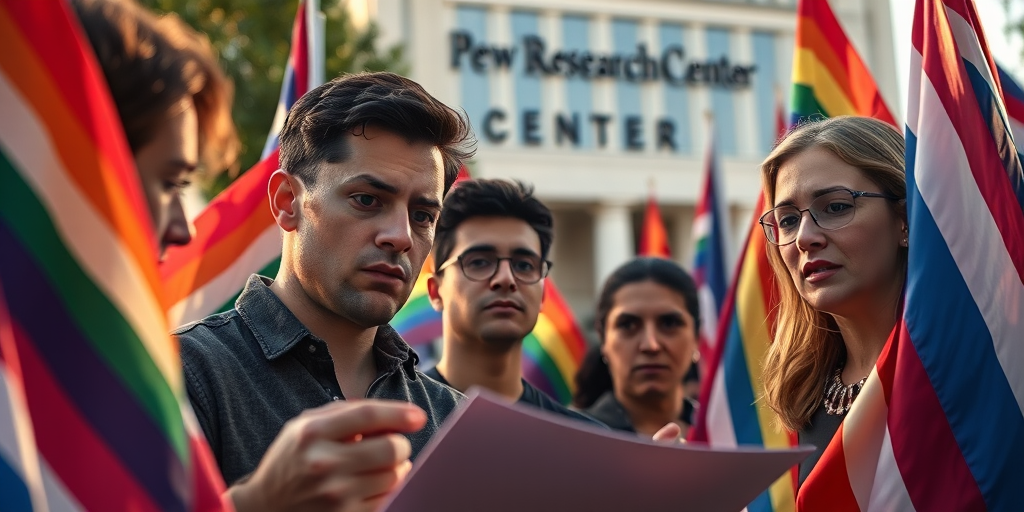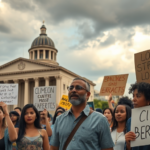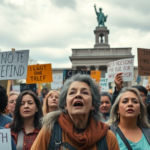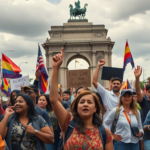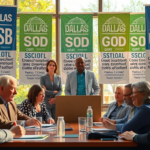**Most LGBTQ+ Adults Believe Americans Are Largely Unaccepting of Transgender Individuals, New Poll Reveals**
In a revealing PBS News Weekend segment aired on May 31, 2025, it was highlighted that a recent Pew Research Center poll has shed light on the disparity in social acceptance between transgender individuals and those who identify as gay or lesbian in the United States. The poll findings point to a significant divide in perception and acceptance levels within the LGBTQ+ community, as well as broader implications for community dynamics across the nation.
**The Findings: A Clear Divide in Acceptance**
The Pew Research Center’s survey involving 3,959 LGBTQ+ adults uncovers a marked disparity in perceived social acceptance. While nearly 60% of respondents believe there is considerable acceptance for gay and lesbian individuals, a starkly contrasting 10% feel the same acceptance is extended to transgender people. Additionally, almost half of those surveyed indicate that there is little to no acceptance for transgender persons, highlighting a critical area of concern within the community.
Giovonni Santiago, a 39-year-old transgender Air Force veteran, shared his personal insights on this issue. Santiago, who runs a nonprofit supporting transgender youth, remains acutely aware of the diminishing acceptance facing transgender individuals. He notes a correlation between declining acceptance and the increase in restrictive legislation targeting gender-affirming care and public access to necessary facilities for transgender individuals. Santiago remarked, “It’s concerning to see this wave of ignorance impacting our community, especially after years of gradual progress.”
**Background Context: Political Influences and Legislative Impact**
The political landscape has direct implications on societal perceptions and legislation concerning transgender individuals. Under former President Donald Trump’s administration, policies negatively impacted transgender rights, including military service bans and restrictions on federal funding for gender-affirming care. These actions have arguably reinforced societal biases, contributing to the current state of acceptance highlighted by the Pew survey.
Moreover, upcoming legal decisions promise to further affect the landscape, with the U.S. Supreme Court soon ruling on a pivotal case regarding a Tennessee law restricting gender-affirming care for minors. The outcome of this case is anticipated to have broad repercussions, setting precedents that will influence future legislative endeavors in other states.
**Impact on Community Bonds and Individual Experiences**
Despite the challenges, there exists a resilient sense of community among LGBTQ+ individuals, with stronger ties often found among transgender people compared to their gay, lesbian, or bisexual counterparts. This community solidarity is crucial, particularly against the backdrop of legislative adversities.
Community organizer Aubrey Campos, based in Fort Worth, Texas, emphasized the growing need for solidarity among younger transgender individuals facing increased social hurdles. “This is a dark time for many, but it’s when community unity becomes our beacon of hope,” stated Campos, underscoring the importance of collective advocacy.
**Local Implications and Community Interest in the RGV**
Among residents of the Rio Grande Valley (RGV), these broader national trends carry significant local relevance. In a region where Hispanic culture and family ties are paramount, efforts to foster acceptance and inclusion are increasingly critical. There is a pressing need for Valley residents to engage in community dialogues and advocacy initiatives that can drive social change and facilitate acceptance.
Commissioner Sandra Lopez, a local official advocating for inclusive policies, highlighted the importance of educational campaigns and community forums aimed at increasing understanding and acceptance. “We must continue to educate and communicate, breaking down the stereotypes and misinformation that fuel bias against transgender individuals,” Lopez remarked, underscoring the potential for local impact through proactive measures.
**Future Directions and Local Resources**
As the debate continues, community members are encouraged to stay informed and engaged. Local organizations and advocacy groups, such as Trans Pride Initiative and the Equality Texas Foundation, offer resources and support for those affected by these issues. Additionally, educational events and public forums provide platforms for dialogue and awareness.
Looking forward, the hope is that ongoing advocacy and legal evaluations will foster a more inclusive society wherein all members, regardless of identity, receive equal acceptance and opportunity. The current trajectory within the RGV and nationwide offers a reminder of the work still required to achieve true equality and universal respect for individual identity.
In conclusion, while the Pew Research Center poll underscores a critical challenge within the United States, it also serves as a call to action for continued advocacy and education, both locally and nationally. As the RGV continues to navigate the complexities of diversity and acceptance, community-driven efforts remain pivotal in shaping an inclusive future.
**Local Resources for Support and Advocacy:**
– **Trans Pride Initiative**: A nonprofit promoting the self-reliance and empowerment of transgender and gender nonconforming persons.
– **Equality Texas Foundation**: Advocating for full equality for LGBTQ Texans through education, community organizing, and advocacy.
– **RGV LGBTQ+ Network**: Hosting support groups and events to foster community solidarity and support throughout the Valley.
Residents interested in engaging more deeply with these issues can attend local forums, reach out to advocacy groups, or participate in educational workshops designed to raise awareness and promote acceptance. As acceptance grows, so does the potential for the RGV to become a leader in fostering a rich, diverse, and welcoming community for all.

